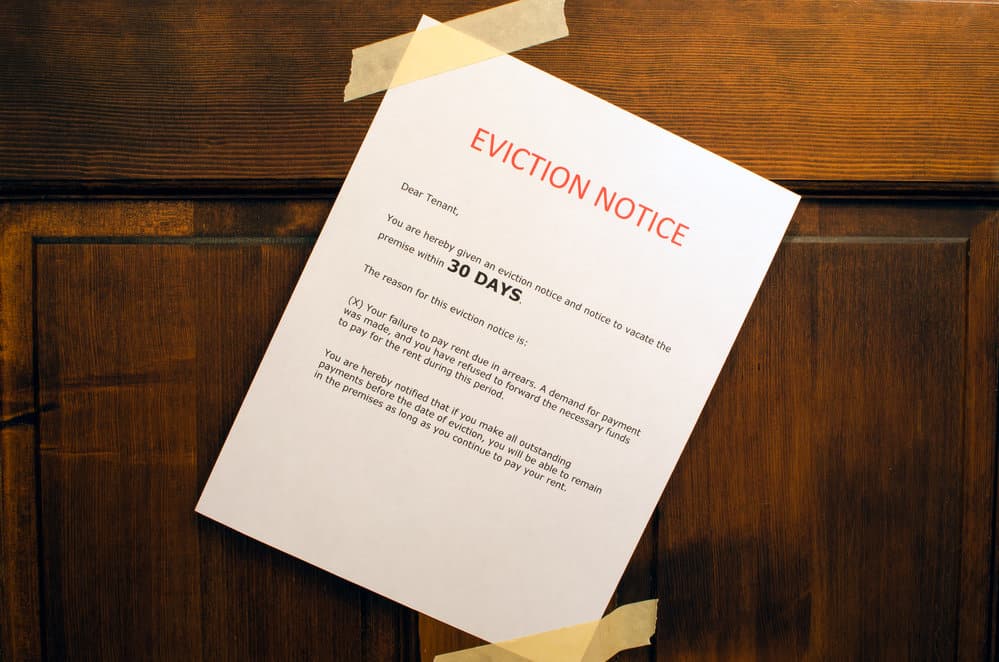Understanding the Florida eviction process is crucial for landlords and tenants to ensure a smooth and legally compliant procedure. This blog post will explore the nuances of Florida’s eviction laws to provide all parties with pertinent information.
We’ll look into when a landlord can begin an eviction, how to present an eviction notification properly, and what takes place afterward it has been presented. Additionally, we’ll explore how to file for an eviction hearing in court and what transpires during such hearings.
Lastly, we’ll examine the consequences of not adhering to the proper Florida eviction process guidelines. By gaining comprehensive knowledge on this subject matter, you can protect your rights as a landlord or tenant while navigating potential disputes related to rental properties in Florida.
What is the Florida Eviction Process?
The Florida eviction process is a series of steps landlords must follow to evict a tenant from their rental property legally. This process ensures that both parties receive equitable treatment and can present their arguments before any definitive rulings are rendered. This section will discuss the various stages of eviction and some important considerations for landlords.
A. Understanding Grounds for Eviction
Before beginning to oust a tenant, landlords in Florida need to comprehend the legitimate reasons for eviction under state law. Some common reasons include the following:
- Non-payment of rent
- Violation of lease terms or rules (e.g., unauthorized pets)
- Damaging the property or causing health hazards
- Engaging in illegal activities on the premises
- Failing to vacate after lease expiration or termination notice has been given by the landlord.
B. Providing Proper Notice
In most cases, before filing an official eviction lawsuit with local courts, landlords must first provide tenants with written notice detailing why they’re being evicted and allowing them to correct any issues within a specified time frame (usually three days). There are different types of notices depending on each situation:
- Three-Day Notice: This type of notice is typically used when dealing with non-payment of rent situations.
- Seven-Day Notice: A seven-day notice can be used for lease violations that can be corrected by the tenant (e.g., unauthorized pets or excessive noise).
- Seven-Day Notice with No Opportunity to Cure: This notice is used when a tenant has committed a non-curable violation or repeatedly violated the same lease term.
C. Filing an Eviction Lawsuit
If the tenant fails to remedy the issue within the specified time frame in the eviction notice, landlords may file an eviction lawsuit, also known as an unlawful detainer action, at their local county court. Landlords must submit all necessary paperwork and pay any associated fees. Florida law requires that the eviction lawsuit be filed in the county where the rental property is located.
D. Attending Court Hearings and Obtaining Judgment
At the hearing, a judge will assess evidence from both parties to determine if an eviction is justified. Landlords must bring all relevant documentation to the hearing, including the lease agreement, any notices served, and proof of lease violations. If successful in proving their case, landlords will obtain a judgment granting them possession of the property and allowing them to move forward with physically evicting tenants.
E. Executing Writ of Possession
After obtaining a judgment from the court granting possession of the property back to the landlord, the final step involves requesting a writ of possession from the county clerk’s office, which authorizes the sheriff’s department to remove tenants from the premises forcibly if necessary. It’s important to note that Florida law requires a notice period of 24 hours before executing the writ of possession.
In summary, understanding Florida’s legal requirements surrounding the eviction process ensures landlords take the appropriate steps to protect themselves while respecting the tenants’ rights.
The Florida Eviction Process is a complicated legal procedure with severe consequences for landlords and tenants. Therefore, it is essential to comprehend the point at which a landlord can initiate an eviction to grasp the process.
Key Takeaway:
Landlords in Florida must follow a specific eviction process to remove tenants from their rental property legally. This involves understanding valid grounds for eviction, providing proper notice, filing an eviction lawsuit, attending court hearings and obtaining judgment, and executing a writ of possession. In addition, landlords must bring all relevant documentation to the hearing and respect the tenants’ rights while protecting themselves.
When Can a Landlord Begin an Eviction?
In Florida, landlords can begin the eviction process under specific circumstances outlined by state law. Comprehending the conditions stipulated by state law is essential for landlords and tenants to guarantee that they conform to legitimate techniques during an eviction.
A. Non-Payment of Rent
The most common reason for initiating an eviction process in Florida is when a tenant fails to pay rent on time. According to Florida Statute 83.56(3), if a tenant does not pay rent within three days after it becomes due, excluding weekends and holidays, the landlord may serve them with a written notice demanding payment or possession of the rental property.
B. Lease Violation
A tenant violating any rental agreement terms, such as having unauthorized pets or causing damage to the property, could also lead to eviction proceedings under Florida law. In this situation, landlords must provide tenants with a seven-day notice specifying which lease terms have been violated and allowing them to correct them before evicting them.
C. Expiration of Lease Term
Another circumstance where landlords can initiate an eviction lawsuit is when the lease term has expired without renewal from either party involved in the rental agreement. Suppose no new agreement has been made between both parties after expiration, and no provision allows month-to-month tenancy continuation. In that case, the landlord may serve proper notice to the tenant.
D. Illegal Activity
Landlords can also begin eviction proceedings if a tenant engages in illegal activities on the rental property, such as drug trafficking or other criminal offenses. In this case, landlords must provide tenants with a seven-day notice to vacate the premises without an opportunity to correct their behavior. Failure of the tenant to comply with this notice will result in further legal action by the landlord.
It is, therefore, imperative that landlords and tenants are well-versed in the eviction laws of Florida. Additionally, proper documentation and adherence to legal procedures are crucial for protecting both parties during the eviction.
Realizing when a landlord can lawfully start an eviction is critical to safeguard oneself from illegitimate activities. Next, we will look at how the eviction notice must be served for it to be legally binding.
Key Takeaway:
Landlords in Florida can initiate eviction proceedings under specific circumstances such as non-payment of rent, lease violation, expiration of the lease term, and illegal activity. Tenants must be given proper notice before landlords take any legal action. Both parties should understand their rights and responsibilities to ensure adherence to legal procedures during an eviction process.
How to Serve an Eviction Notice
In Florida, the eviction process requires serving an appropriate notice to inform tenants of their violation and give them a chance to address it before further legal action is taken. To ensure that you are following proper procedure, consider these essential aspects when serving an eviction notice:
A. Choose the Appropriate Notice Type
In Florida, there are three main types of eviction notices: Three-Day Notice to Pay Rent or Quit, Seven-Day Notice to Cure for lease violations other than non-payment of rent, and Seven-Day Unconditional Quit Notice for repeat offenders who have received prior warnings about lease violations.
B. Include Required Information on the Eviction Notice
An effective eviction notice should contain all necessary information, such as:
- The full names of all tenants listed on the rental agreement;
- The address of the rental property;
- A clear description of how they violated their lease agreement;
- The amount owed (if applicable), including any late fees;
- Instructions on how they can remedy their violation within a specified time frame; and,
- Note: If payment must be made in person or via mail, provide details regarding where payments should be sent.
C. Properly Delivering The Eviction Notice
To properly serve your tenant with an eviction notice under Florida law (Florida Statute Chapter 83 Part II), you must use one of the following methods:
- Personal delivery to the tenant;
- If they are not available, leave a copy with another adult at their residence or,
- Note: If this method is used, sending a copy via certified mail is also recommended.
In some cases, if neither personal delivery nor leaving a copy with an adult at the residence is possible, posting the notice in a conspicuous place on the property may be allowed. However, it is recommended to consult legal advice before utilizing this as a last resort.
D. Keep Records Of The Eviction Notice
Maintaining accurate records of your eviction notice can help protect you from potential disputes during court proceedings. Be sure to keep copies of all notices served and any proof of services, such as receipts for certified mail or affidavits from process servers who delivered them personally.
It is essential to document the delivery of an eviction notice for future reference. In addition, after serving an eviction notice, it is beneficial for all parties involved to be cognizant of the ensuing steps to guarantee that everyone comprehends their rights and responsibilities.
Key Takeaway:
To issue an eviction notice in Florida, landlords must include the tenants’ names, the rental property’s address, a description of a breach in the lease agreement (if any), the sum due (where relevant), and instructions on how to fix it. The notice can be delivered personally or left with another adult at their residence; sending a copy via certified mail is also recommended. In addition, accurate records should be kept for potential disputes during court proceedings.

What Happens After an Eviction Notice is Served?
Upon delivery of an appropriate eviction notice in Florida, the tenant is allocated a definite amount of time to respond or rectify the problem. The response period depends on the type of eviction notice that was given:
- Three-Day Notice: Tenants have three business days (excluding weekends and legal holidays) to pay rent or vacate the property.
- Seven-Day Notice with Cure: Tenants have seven calendar days to correct lease violations, such as unauthorized pets or excessive noise.
- Seven-Day Unconditional Quit Notice: Tenants must vacate within seven calendar days due to severe lease violations, such as illegal activities on the premises.
If tenants fail to comply with these notices within their respective deadlines, landlords can proceed with filing for an eviction hearing at their local county court. Both parties involved in this process must know their rights and responsibilities under Florida law.
Tenants receiving an eviction notice should thoroughly examine it and consult a knowledgeable legal representative if they have reasons to challenge it. For example, if there are habitability issues that the landlord hasn’t addressed, tenants may be able to fight against wrongful evictions through what’s known as a “rent withholding” defense (source). Additionally, some defenses may arise from improper service of the eviction notice itself; therefore, understanding your rights is crucial during this stage of proceedings.
In cases where tenants choose not to contest their evictions but still refuse to leave voluntarily after the notice period has expired, landlords must continue with the legal eviction process by filing a complaint and summons in court. This is necessary to obtain a judgment for possession of the property, which ultimately allows law enforcement officers to remove tenants if they don’t vacate willingly.
Once the eviction notice is served, tenants should take steps to assert their legal rights. Tenants who desire to challenge an eviction can seek a court hearing to present their argument before a judicial authority.
Key Takeaway:
After receiving an eviction notice in Florida, tenants have a specific amount of time to respond or remedy the situation, depending on the type of notice given. Suppose they fail to comply with their respective deadlines. In that case, landlords can file for an eviction hearing at their local county court and obtain a judgment for possession of the property if necessary. All parties involved must know their respective rights and obligations under Florida law.
How to File for an Eviction Hearing
Before proceeding to court, landlords in Florida must file for an eviction hearing to present their argument before a judge and pursue legal remedies. To ensure that you follow the proper procedure and increase your chances of success, consider these steps:
- Gather necessary documents: Before filing for an eviction hearing, ensure you have all relevant documentation ready. This includes copies of the lease agreement, rent payment records, any written notices provided to the tenant (such as a Three-Day Notice), proof of service or delivery confirmation for those notices, and any other evidence supporting your claim.
- Complete required forms: To initiate the court proceedings, landlords must complete two primary forms: (1) Complaint for Landlord-Tenant Eviction (Form 5A) if seeking possession only; or (2) Complaint for Landlord-Tenant Eviction – Damages (Form 5B) if also seeking damages such as unpaid rent or property damage.
- File with the county clerk’s office: Once completed and signed by both parties involved in the dispute – landlord(s) and tenant(s) – submit these forms and appropriate filing fees at your local county courthouse where the rental property resides. More info about local prerequisites can be accessed from the county clerk’s website.
- Serve the tenant: After filing, the court will issue a summons that must be served to the tenant. This can be done by a sheriff or certified process server, who will provide proof of service once completed. It is essential to follow proper service procedures as outlined by Florida law.
Note that during this time, it’s essential for landlords to continue following all applicable laws and regulations – including not engaging in any form of “self-help” eviction tactics such as changing locks or shutting off utilities. Doing so could jeopardize your case and result in penalties.
Filing for a court hearing to initiate the eviction process in Florida should be done without delay. The following heading will discuss what happens at the actual eviction hearing itself.
Key Takeaway:
To file for an eviction hearing in Florida, landlords must gather the necessary documents and complete the required forms (Form 5A or Form 5B) before filing with the county clerk’s office. After filing, a summons will be issued that must be served to the tenant by a sheriff or certified process server while following proper service procedures outlined by Florida law. Landlords need to continue following all applicable laws and regulations during this time to avoid jeopardizing their case and facing penalties.
What Happens at the Eviction Hearing?
During an eviction hearing in Florida, it is essential to comprehend what occurs during this procedure after both parties have been informed and a petition for eviction has been filed. At the eviction hearing, both landlord and tenant will present their cases to a judge, who will decide whether to grant the eviction.
A. Preparing for the Hearing
Before attending the eviction hearing, both parties should gather all relevant documentation, such as lease agreements, payment records, notices served, and any other evidence that supports their case. In addition, both parties must be equipped with a precise elucidation of their position before the eviction hearing.
B. Presenting Your Case
At the hearing, both landlord and tenant can make their respective cases known before a judge. This may include calling witnesses or presenting physical evidence, such as photographs or documents proving property damage caused by tenants, if applicable.
- Landlord: As a landlord seeking eviction in Florida, your main goal is to prove a valid reason for evicting your tenant (e.g., non-payment of rent) and that you followed proper procedures throughout the process.
- Tenant: If you are defending against an eviction action as a tenant in Florida, it’s essential to provide any evidence supporting your claim that you did not violate the terms of your rental agreement or showing reasons why withholding rent was justified (e.g., uninhabitable living conditions).
C. The Judge’s Decision
Once both parties have presented their respective arguments and evidence, the judge will render a verdict. If the ruling favors the landlord, a Final Judgment for Possession may be handed down, giving the tenant an allocated period to leave (typically 24 hours). Failure to comply with this order can result in forcible removal by law enforcement.
However, if the judge sides with the tenant or finds that the landlord did not follow proper eviction procedures, an eviction cannot proceed. In some cases, tenants may even be awarded monetary damages if it is determined that landlords acted improperly during any part of Florida’s eviction process.
At the hearing, a court will determine its ruling on the facts provided by both sides. However, moving forward, it is essential to understand the consequences of not following through with the Florida Eviction Process.
Key Takeaway:
At an eviction hearing in Florida, a judge evaluates the landlord and tenant’s arguments to determine whether or not to grant the eviction. The parties must accumulate applicable documentation and proof supporting their position and offer a lucid viewpoint description. If landlords followed proper procedures and there was a valid reason for evicting tenants, the judge may issue a Final Judgment for Possession; otherwise, an eviction cannot proceed.
What are the Consequences of Not Following the Eviction Process?
Not following the proper eviction process in Florida can lead to severe consequences for landlords, including legal penalties and delays in regaining possession of their property. Here are some potential outcomes if a landlord fails to adhere to the required procedures:
- Invalid eviction notice: A court may deem it invalid if a landlord does not provide adequate notice or follow specific requirements when serving an eviction notice. This would force the landlord to restart the process, causing further delays.
- Lawsuits from tenants: Tenants who believe they have been wrongfully evicted may file lawsuits against their landlords for damages. These cases could result in financial compensation awarded to tenants and even punitive damages against landlords guilty of wrongful eviction practices.
- Criminal charges: In extreme cases where landlords engage in illegal activities such as “self-help” evictions (e.g., changing locks without going through proper channels), they could face criminal charges under Florida law (§83.67). Penalties include fines and possible imprisonment.
- Tarnished reputation: Landlords who do not follow proper procedures risk damaging their reputations within their communities and among prospective tenants, making it more difficult for them to rent properties in the future.
To avoid these negative consequences, landlords must educate themselves on Florida’s eviction laws and seek professional guidance when necessary – whether through consulting with an experienced attorney or utilizing resources provided by local housing authorities like Miami-Dade County’s Public Housing Agency (MDPHA). Landlords can protect their interests and maintain positive relationships with tenants by following the proper eviction process.
The Florida eviction process can be complex and overwhelming for landlords and tenants. Therefore, it is essential to be aware of the regulations and stages that are a part of this procedure to ensure equity.
From serving an eviction notice to filing for an eviction hearing, each step has specific rules that must be followed. Failure to comply with these rules can result in serious consequences.



